Now when Jesus learned that the Pharisees had heard, ‘Jesus is making and baptizing more disciples than John’— although it was not Jesus himself but his disciples who baptized— he left Judea and started back to Galilee. But he had to go through Samaria. So he came to a Samaritan city called Sychar, near the plot of ground that Jacob had given to his son Joseph. Jacob’s well was there, and Jesus, tired out by his journey, was sitting by the well. It was about noon. A Samaritan woman came to draw water, and Jesus said to her, ‘Give me a drink’. (His disciples had gone to the city to buy food.) The Samaritan woman said to him, ‘How is it that you, a Jew, ask a drink of me, a woman of Samaria?’ (Jews do not share things in common with Samaritans.) Jesus answered her, ‘If you knew the gift of God, and who it is that is saying to you, “Give me a drink”, you would have asked him, and he would have given you living water.’ The woman said to him, ‘Sir, you have no bucket, and the well is deep. Where do you get that living water? Are you greater than our ancestor Jacob, who gave us the well, and with his sons and his flocks drank from it?’ Jesus said to her, ‘Everyone who drinks of this water will be thirsty again, but those who drink of the water that I will give them will never be thirsty. The water that I will give will become in them a spring of water gushing up to eternal life.’ The woman said to him, ‘Sir, give me this water, so that I may never be thirsty or have to keep coming here to draw water.’ 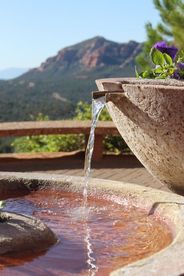 If I were putting this story onto a stage, I'd concentrate on the props and the scenery I think. The well needs to be old, crafted from misshapen rocks. A sacred place that could handle heavy traffic. People coming and going, stopping and chatting. Perhaps some other large rocks around that have been warn and smoothed by many people taking a rest. A tree or two around the well, maybe a few desert brush providing some shading. And many paths clearly leading to and from the well. The woman comes from one direction. Jesus from another. His disciples take yet another away when they go to find food. And her bucket - the prop that I cannot seem to get away from. Is it a bucket made of wood? Is it a gourd? Is it a water jar crafted of clay? Is there a string on it that she brings from her home or is there a rope at the well that people use? Well water. Dependent on the land in a way that so many of us no longer understand. This woman brought her bucket. The vessel that collected her need. But after her encounter with Jesus, she left the vessel behind. 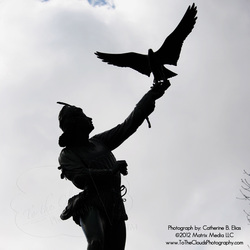 Was she giving it to Jesus to use? Had she decided to offer him a drink and instead of carrying her vessel back, she left it for Jesus to use? But he doesn't need water. He serves up life giving, everlasting thirst quenching "water." And the disciples have arrived, interrupting the moment that Jesus was having with the woman. Jesus isn't hungry either. He has "food" no one knows about. Maybe it is the disciples who need the vessel? What is this vessel? What does it represent? It is her proverbial shopping bag. I carry bags filled with bags every time I go to the grocery store. Does her vessel represent the things that sustain our lives? Is it money? independence? career? vocation? hobby? relationship? What are the vessels that aid in our existence, that keep us alive? What happens when those things are no longer needed? How is it possible to encounter Jesus in such a way that our vessels are no longer needed?
0 Comments
Now there was a Pharisee named Nicodemus, a leader of the Jews. He came to Jesus by night and said to him, ‘Rabbi, we know that you are a teacher who has come from God; for no one can do these signs that you do apart from the presence of God.’ Jesus answered him, ‘Very truly, I tell you, no one can see the kingdom of God without being born from above.’ Nicodemus said to him, ‘How can anyone be born after having grown old? Can one enter a second time into the mother’s womb and be born?’ Jesus answered, ‘Very truly, I tell you, no one can enter the kingdom of God without being born of water and Spirit. What is born of the flesh is flesh, and what is born of the Spirit is spirit. Do not be astonished that I said to you, “You must be born from above.” The wind blows where it chooses, and you hear the sound of it, but you do not know where it comes from or where it goes. So it is with everyone who is born of the Spirit.’  And so it begins... John's expose' on the spiritual life. There is natural birth, the waters of the womb and then there is spiritual birth. The discussion takes place in the darkness of evening between two scholars. But the discussion quickly turns from dialogue to expose' - the writer moves away from dialogue and begins speaking about Jesus in the third person. I wish for a more fleshly conversation between these two men. I wish for Jesus' words to be less heavenly. I get where Nicodemus is coming from. He doesn't even get a question out before Jesus starts going on and on about the Spirit, mixing in Moses of course as a helpful guide. If Jesus had given Nicodemus a chance to spit out a question, or had probed him to get at what he was asking, I wonder what it would have been. Who are you? How do you do these things? Where did you come from? What do you believe of the presence of God? How is it that you have the presence of God? Everyday? With every move? And would he go as far as to ask, How might I live with the presence of God in my life? Everyday? With every move? I guess that's what Jesus is trying to answer. You must be born of anew. Maybe. Before we lose the dialogue, Jesus introduces the idea of heavenly things vs. earthly things.  And then the passage moves away from dialogue and into a statement about trust. The writer argues that we must trust in the son, like the Hebrews trusted in the serpent that Moses held. And the passage ends with a statement of judgment. People love darkness more than light because our deeds are evil. Are those the answers to Nicodemus' question about the presence of God in our lives. Or are they the keys to understanding heavenly things? Trust and light. Life in the Spirit. Living with the presence of God moment to moment. If we could boil down some helpful hints about walking this earthly life in a heavenly manner, wouldn't we include the imperative of trust and the need to follow the light even if, especially if, it exposes our darkness? This is not something Nicodemus can attain through study. The presence of God here on earth is found when we fall into the God's path, when we give in fully - trust. The presence of God here on earth is found when we dare enter the light. For Nicodemus, I wonder what was his issue of trust that day when they spoke in the night? What was he wrestling with? What were the concerns on his heart and in his mind and how did he receive this challenge to trust? Could Nicodemus put his finger on an area of his life where he wanted light or needed light but like Jesus said, he was keeping it in the dark instead? What did he think of this challenge to enter the light rather than stay in the dark? And what of us - are we intrigued by the presence of God in Jesus' life? Do we listen to the stories of Jesus' life and wonder - how is it that the heavenly world worked so vividly through him? And if so, would we accept the invitation to new birth if it meant that we must trust and walk into the light? The Passover of the Jews was near, and Jesus went up to Jerusalem. In the temple he found people selling cattle, sheep, and doves, and the money-changers seated at their tables. Making a whip of cords, he drove all of them out of the temple, both the sheep and the cattle. He also poured out the coins of the money-changers and overturned their tables. He told those who were selling the doves, ‘Take these things out of here! Stop making my Father’s house a market-place!’ His disciples remembered that it was written, ‘Zeal for your house will consume me.’ The Jews then said to him, ‘What sign can you show us for doing this?’ Jesus answered them, ‘Destroy this temple, and in three days I will raise it up.’ The Jews then said, ‘This temple has been under construction for forty-six years, and will you raise it up in three days?’ But he was speaking of the temple of his body. After he was raised from the dead, his disciples remembered that he had said this; and they believed the scripture and the word that Jesus had spoken. When he was in Jerusalem during the Passover festival, many believed in his name because they saw the signs that he was doing. But Jesus on his part would not entrust himself to them, because he knew all people and needed no one to testify about anyone; for he himself knew what was in everyone. 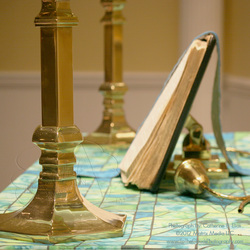 I'll tell you what - I'm not sure this is the kind of behavior Mary and Joseph instilled in Jesus as they were teaching how the temple rituals. Can you imagine Jesus at festival in his early life? Holding Mary's hand as they climb the steps? Sitting beside Joseph with the other men as he learns Hebrew and sings the prayers? I'm sure they raised him a "good Jewish boy," one who follows the rules, knows the law, respects the priests, honors the tradition. What would his mother say of him that day? Jokingly, I can almost hear her say, "Jesus, use your inside voice." We don't run in church. And we don't talk back to the adults. We are respectful and we most certainly do not make a whip of cords and drive all of the money changers and their animals out of the temple. We do not overthrow their tables! And what might Jesus say to those instructions - the ones that go along with using our inside voice? Well, I imagine he might turn with the snap of his head and the bitter taste of adrenaline in his mouth say, "Sometimes inside voices aren't good enough." 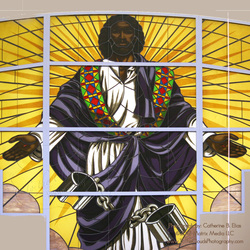 This is a very different picture of the light of the world, the lamb of God, the word made flesh. This is a different side of the man who saved the wedding from running out of wine. Is this his shadow side? No. I think it what we see when light shines on darkness. The light of the world is not shining in this scene at a happy, joyful celebration. The light of the world is shining in the dimly lit corners of corruption and deceit. The lamb of God has called a prison break for the animals ready to be purchased for slaughter. The word made flesh stands toe to toe with the money changers, selling forgiveness and righteousness. Not to get ahead of ourselves but in the next chapter we will hear Jesus saying that humans love darkness instead of the light. Why? Because their deeds are seen in the light. Why do we love darkness instead of the light? Because when the light of the world walks up the steps of the temple, the shadow side of religion is exposed. And this begs the question, what's in our shadow side? Where is the injustice in our religious world? Who are the money changers? What or who are the sacrificial animals? Who are the buyers and who are the sellers? Do we dare ask Jesus to shine light in those places? Do we dare look for Jesus' presence in our darkness? If we do, we better be ready for Jesus to forgo his inside voice. On the third day there was a wedding in Cana of Galilee, and the mother of Jesus was there. Jesus and his disciples had also been invited to the wedding. When the wine gave out, the mother of Jesus said to him, ‘They have no wine.’ And Jesus said to her, ‘Woman, what concern is that to you and to me? My hour has not yet come.’ His mother said to the servants, ‘Do whatever he tells you.’ Now standing there were six stone water-jars for the Jewish rites of purification, each holding twenty or thirty gallons. Jesus said to them, ‘Fill the jars with water.’ And they filled them up to the brim. He said to them, ‘Now draw some out, and take it to the chief steward.’ So they took it. When the steward tasted the water that had become wine, and did not know where it came from (though the servants who had drawn the water knew), the steward called the bridegroom and said to him, ‘Everyone serves the good wine first, and then the inferior wine after the guests have become drunk. But you have kept the good wine until now.’ Jesus did this, the first of his signs, in Cana of Galilee, and revealed his glory; and his disciples believed in him.  Convergence: where water meets land Convergence: where water meets land I always stumble when I see the words "on the third day." Not just because the story tells us Jesus rose from the dead on the third day but because in a literary sense, I've always understood "the third day" to mean "when the fat lady sings." In other words, it's a literary device that indicates the time is now, let's rock 'n roll, get this party started, we're ready to go. So on the third day, Mary could hear the proverbial fat lady singing and... Jesus couldn't? I mean he says in no uncertain terms, "My hour has not yet come." And again, we stumble on yet another phrase/word "my hour." Two words for hour in Greek, this is the one that means broader sense of time, season, moment. Mary knows this is Jesus' moment but Jesus does not. So much for John's gospel having an all knowing, always the deity version of Jesus! Although he does come through, saving the day with the best wine served last. He seems to be unaware or uncertain or uncomfortable with his time being now. 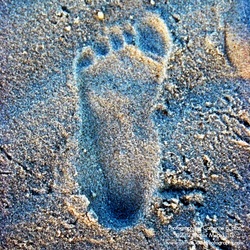 Convergence: where our feet meet the moment Convergence: where our feet meet the moment How very human! With our uncertainties, our insecurities, our constant wondering if we are doing right, being right, making the right choices. And a moment of thanks for our mothers who often know right before we know and who certainly taught us the concept of right. Who is it in your life that helps you see right? And right meaning righteousness. Who helps you see what is right or righteous in life? Who helps you see the straight path? And how often do you disagree? Mary saw three things: Jesus' abilities/calling, the need before them and the moment. It was Mary who saw the of those three things; Mary saw the potential. Do you have a person in your life who sees your gifts/calling? Do they also have the ability to see the needs before you? And can they discern the "moment?" I may have friends like this but I'm wondering if I ignore their advice/doubt their discernment? I would certainly rather know or discern for myself. I would rather act on my own instincts, not the instincts of others. But that's not the picture we have in John chapter 2, the story is of a man who takes the advice of a faithful companion (his mother in this case). A man who trust what someone else imagines of his gifts. Perhaps "turning water to wine" is about the convergence of our abilities with the needs around us at the right time. And perhaps we need others to help us discern that kind of convergence. |
Search this blog for a specific text or story:
I am grateful for
|

This work is licensed under a Creative Commons Attribution-NonCommercial-ShareAlike 3.0 Unported License.
